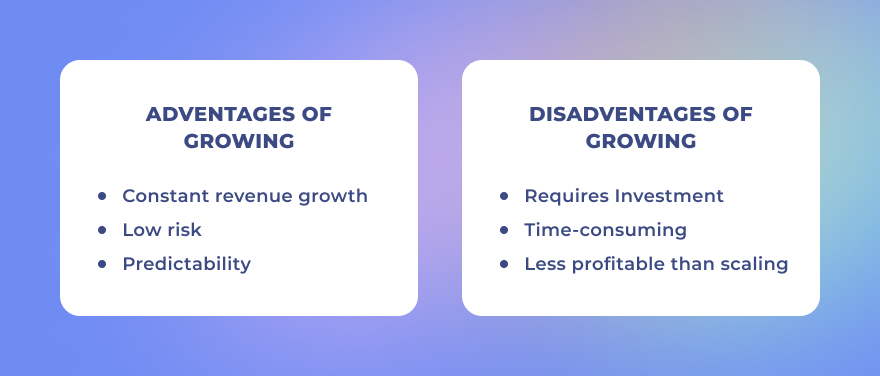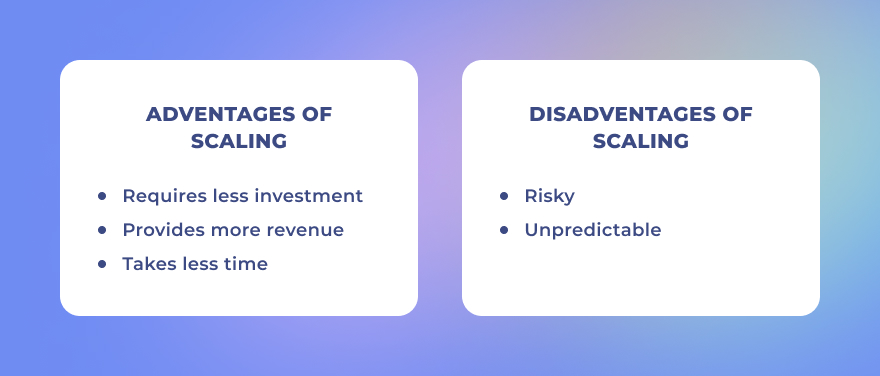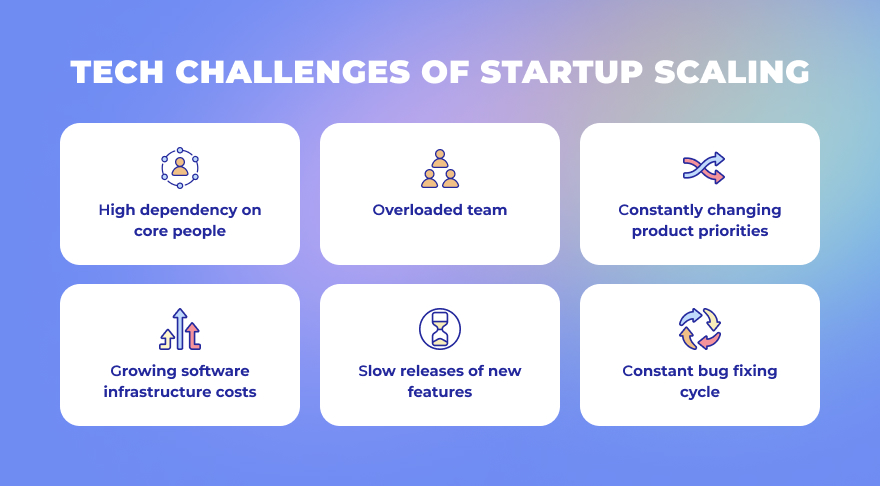Table of Contents
Do you remember when you finally launched your startup? Most likely, it felt amazing, and you have experienced great relief. Later, thanks to hard work and the right team your customer base started to expand, the product has become more stable, and more profit started to appear. You have seen more opportunities for your startup, and naturally, you decided to chase them.
However, it might be the point where things become difficult. You might dedicate even more resources than usual, but the startup stagnates instead of seamlessly scaling up.
The key here is to change your approaches. The way you have handled your startup’s growth in the early stages won’t fit the scaling startup. Hence, you need to be ready to reassess and reinvent how your team operates.
Altamira has been helping tech-focused startups overcome this critical growth stage and find the right direction. In this article, we reveal the main insights you need to scale successfully.
Scaling Up as the Next Step of Your Startup Development
Let’s get to the basics. What is a scale-up and how does it differ from a startup?
Basically, a scale-up is a startup that has found its business model, proved it viable, and managed to establish business processes.
Here is a list of main criteria that will show that your startup is turning into a scale-up following.
Growing vs Scaling
To understand more clearly what is startup scaling, you need to comprehend the difference between the processes of growing and scaling.

Business growth usually means that the company’s revenues increase due to an increase in resources. For example, if the company hires more sales managers, they attract more customers, and eventually, it converts into more money. To achieve that, the company needs to secure expenses for hiring new employees.

On the other hand, scaling means that the revenues will grow without a significant increase in expenses.
Common Challenges of Startup Scaling Process
Successful startup scaling sounds like a dream of every founder. However, there are too many pitfalls that can create significant problems or even undermine the future of your startup. Let’s look through the biggest challenges of how to scale a startup.

Timing
Premature scaling is one of the most common reasons why startups fail. Everything aspect of your startup (product, team, business model, processes, etc.) should be suitable to withstand increasing volumes and changes.
Otherwise, you risk getting into a situation where you have resources to scale (more customers, more employees, or more funding), but it would only break everything because you are not able to leverage them correctly.
Scaling amplifies everything. So, if your startup had some problems that didn’t bring a lot of harm due to small volumes, now, they can become a big issue will be obliged to face.
So, before thinking about scaling, you should ensure that you have found an answer to every question on how your business operates: who your customers are, what the value of your product is, what the team structure is, and how your marketing team engages new customers and how much it costs, etc.
Knowledge Sharing
Knowledge sharing doesn’t seem like an issue when your team consists of ten-fifteen people. However, with the team growing, it becomes a big concern. The early employees that have project knowledge are most likely to become management teams and delegate the majority of operational tasks to newly hired specialists.
But, to do their work efficiently, the aforementioned specialists need to obtain this project knowledge. At this point, a lot of processes might get stuck, as leads won’t always have time to provide the info, and specialists will be bound to figure everything out by themselves, risking making unnecessary mistakes.
Human Factor
Scaling means changes: you just can’t do things the way you have been doing them previously and hope to receive another result. However, some of your employees can not share your excitement regarding scaling up and the changes it implies.
Such employees might sabotage you’re scaling up, whether they do it consciously or subconsciously.
Vision
We have talked about product market fit and how your solution should find its niche market. However, when you have matched with your target audience and tested your product’s concept on small volumes, you need to have a plan for your product development as a part of a scaling strategy.
The lack of vision regarding future functionality will make the development of new product features chaotic. And in our experience, it will most probably lead to massive resource loss, extended deadlines, an overloaded and burnt-out team, messy decision-making, and miscommunication. It might also affect the customer experience and lead to negative feedback you wouldn’t want to receive.
Tech
Tech aspects of your startup development might become a huge pitfall, especially, if you haven’t thought about the future steps at the beginning of your journey.
By that statement, we mean that tech requirements for a newly-born startup will differ significantly from the requirements a well-established tech product should have. If you haven’t designed a product architecture and prepared a reliable infrastructure that is scalable, you will definitely struggle to successfully scale, develop efficiently new features, or onboard potential customers.
Main Aspects You Should Secure To Guarantee Successful Scaling
So, how to scale a startup? It is hard to describe one road map, as this process happens differently for every other startup business. There are different triggers that push decision makers to work on startup scaling strategy. It might be new funding round, a new marketing strategy that started to drive more traffic and leads, and so on.
Whatever has pushed you through the threshold and launched scaling, you need to take care of the next three aspects to ensure an efficient and hassle-free process.
Team
The right team is always a key to success. The biggest challenges will be surmountable if you have reliable managers and employees who are motivated and professional enough to understand the specifics of the company scale.
At the same time, successful scaling demands not only the right company culture but a team composition that fits your startup scaling strategy perfectly. A lot of businesses think that hiring more developers will be enough to speed up their development and eliminate issues with productivity and performance.
In reality, such a strategic decision will be useless if the issue lies in other things. More often, the team struggles to amplify the development due to the lack of core specialists who should take care of strategizing, collaborations with extended teams and vendors, knowledge transfer, and onboarding of new team members.
Hence, for scaling, you will need to have a core team, a defined strategy for your team growth, as well an onboarding plan for every newcomer.
Process
Set up processes is a must-have, otherwise, you won’t be able to focus on actual scaling but rather on “putting out fires” that will only increase in numbers (remember that scaling amplifies issues you have already had?).
To have great operational efficiency, you need to build your processes and decision-making upon data. You should define key metrics you will track to measure the progress of your project and use them to determine the next steps.
Product Strategy
We mentioned the importance of product strategy before in this article. Ideally, the long-term vision of your product development determines almost everything, from your team composition to your marketing activities.
A long-term backlog assists you to follow the direction you have chosen for your startup business but have enough flexibility to react to market fluctuations and customer feedback. In turn, a short-term backlog helps you to set up short-term goals and plan team activity wisely.
Technology
Technology challenges stall your scaling: if the tech of your product isn’t designed for scaling, efficient and fast scaling is out of the question completely.
For efficient scaling, you will need your tech to fit the next points:
Altamira’s Accelerate Development Service for Successful Scale Up
So, have you read this article and see something similar with your own startup? You might think: “Okay, we definitely encountered some things these guys have mentioned, and we see how it can harm our startup. But how can we fix them?”
The thing is that every case is unique, even if the challenges are similar for everyone. To help scaling startups overcome the stagnation we have been describing, we created a stand-alone service named “Accelerate Development”.
This service is designed specifically for startups struggling with further steps. It is not a cliche custom software development or outstaffing service.
With “Accelerate Development”, we come and analyze what you have achieved already, what is working as it should and what needs improvement, then, we build an action plan for short-, and long-term perspectives and take on its implementation in close cooperation with you.
There are three stages we will go through together:
The first stage, uncovering consists of several workshops when we get together and to analyze the state of three essential steams of your project: product, team & process, technology;
The second stage implies the creation of the now-later plan. In our case, it would include three phases:
- now, a set of actions aimed to bring immediate relief;
- soon, a plan of improvements we will implement to have time and resources for working on strategical changes;
- later, a set of long-term goals and actions eventually will bring process optimization and remove any chances for a similar scaling stall.
And the last, third stage called execution ensures the implementation of the aforementioned plan, as well as the setup of metrics and control points. The team of a business analyst or a product owner, a project manager, a client success manager, a solution architect, and other technical specialists like artificial intelligence or data engineers are working to execute the strategy.
In the end, you will get the next results:
Our team goes beyond consulting: we help you monitor, implement and secure every step of the strategy. We will become your partner and guide you through every possible bump on the road.
Final Thoughts
Scaling is an important part of startup life, and how well the team handles this stage will determine the future of this business. Efficient scaling means more revenue without wasting budgets, time, and efforts. This can be achieved if you scale wisely, and it is possible if you leverage the expertise and experience of those who have done it already.
Altamira is ready to share this specific knowledge. We can help you to scale up your startup business successfully with clear timelines, roadmaps, and strategies.
We won’t just give you some pointers and leave you to figure everything out on your own: our team will go through every challenge together with you until we get the desired result.



